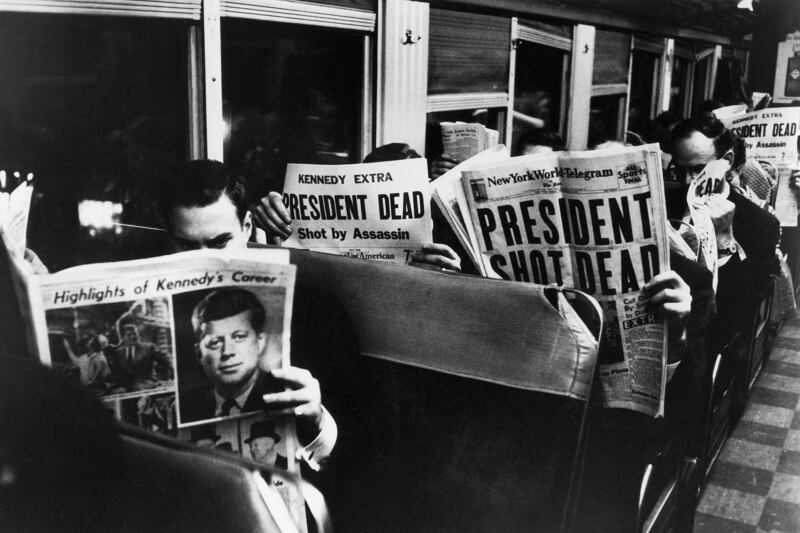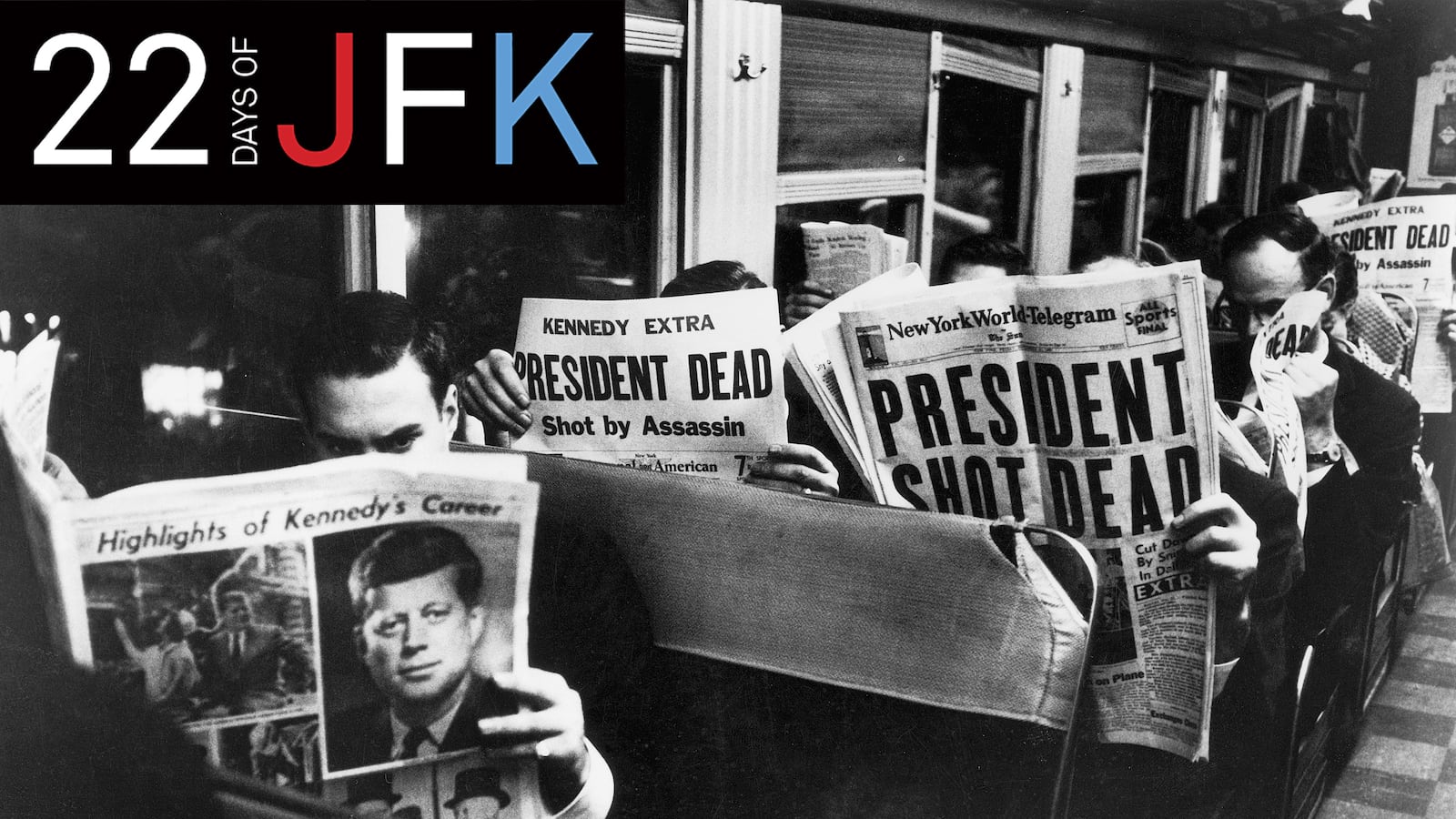They turned us loose early that day.
I was sitting in a 6th grade classroom when the principal came on the intercom to say the president had been shot. One kid stood up at his desk and did a little cheer. Some girls shushed him. A little later the principal came back on to say that President Kennedy was dead.

We got out at 2 p.m. instead of 3, but no one got particularly excited about that. We just milled around the front of the school, waiting for our parents to come and pick us up. They would know what was going on and explain.
Anyone who was alive on Nov. 22, 1963, knows where they were when they heard that President John F. Kennedy had been assassinated.
Perhaps we cling to this knowledge because it’s all that any of us knows for sure about that day, or the last thing any of us would know for certain about the death of the president. After that moment, so much was thrown into question. Who killed the president? What was the true nature of his legacy? What might have happened had he lived? These questions are debated today as fiercely as they were 50 years ago, because questions are all we have.
The Kennedy assassination was the first national tragedy to play out in real time, on national television, with all the messiness of the present tense. News of the Japanese attack on Pearl Harbor—the only previous event even remotely as galvanic as the assassination—was practically scripted by comparison: People heard the news from President Roosevelt himself (on radio, hours after the attack) and there has never been a more black-and-white event in the nation’s history. The culprits made no attempt to hide their identities or their intentions.
It is almost impossible to convey to someone who did not live through that 1963 weekend what it was like. Assassination was something that occurred in other countries, other centuries. It was nothing we were familiar with. Adults and children alike stumbled through the aftermath, unclear as to what had just happened or why or what it meant. For those of us who were children at the time, it was the first time in our lives in which our parents—all adults really—didn’t know any more than we did. That complete lack of omniscient authority, the sense that no one had the answers—if you were a kid then, that was the most terrifying thing about a very long weekend that in some ways feels like it never ended. Everyone gives up on childhood innocence at some point, but how often does it happen to an entire generation almost overnight?
That whole weekend progressed like a play where every act was written by a different playwright, or a play where all the acts were in the wrong order. The news that the president was murdered was followed hours later by news of an alleged assassin’s capture. Lee Harvey Oswald, of course, was a complete cipher from the start, and the squirreliness of his character only grew more pronounced with each new revelation (he escaped the crime scene by city bus?!). But the most bizarre aspect was how time seemed to slow down and speed up without warning. There was nothing to do that weekend but watch television, and there was nothing on television but news of the assassination and the forthcoming funeral, with endless televised shots of mourners moving past the casket in the Capitol rotunda that proceeded with the elegant lethargy of dreams. Then a newscaster would break in with some ratatattat announcement that amounted to nothing, and then it was back to the rotunda. By Sunday morning we were all still staring into the TV screen like it was some noir narcotic, but at least things seemed to be getting back to normal. Order was, if not restored, then at least imposed (funeral plans in place, alleged assailant in custody). Then, out of nowhere Jack Ruby shot Oswald, and the nightmare erupted all over again. By the time the funeral took place on Monday, things that would normally touch the heart or even inspire us (a small boy saluting his fallen father, a riderless horse with boots reversed in the stirrups) just seemed like sad, vagrant images begging for an organizing narrative that never arrived.
At that point, it was as though someone took the drama in progress and ripped off its last act, because when Oswald died, conclusive answers died with him.
Bob Dudney, a Dallas Times Herald reporter, spent years tracking down and debunking conspiracy theories arising out of the deaths of Kennedy and Oswald. In 1976, he and his conspiracy-chasing co-worker Hugh Aynesworth were profiled in Esquire by Nora Ephron, who concluded her story with a quote from Dudney:
“The other night I was at a party,” he said, “and we were talking about certain great events that shaped the lives of people my age. The emergence of the Beatles and the Vietnam War were obvious influences. And I said that I thought the assassination of Kennedy was a big influence—and as soon as I said that it I corrected myself. Oswald’s death was more an influence than Kennedy’s. Had he lived, so much more would have come out. His death left us a legacy of suspicion and doubt that’s turned in on everybody. It’s unusual. Such a neurotic little man, who was really such a loser, you know, and he’s left a very profound influence. The country would have recovered from the death of John Kennedy. But it hasn’t recovered yet from the death of Lee Harvey Oswald and probably never will.”
The assassination did not singlehandedly create the social chaos that erupted in the ‘60s, but it is hard to imagine that decade playing out the way it did had Kennedy survived. The Warren Commission Report baldly tried to set things right with an understandable narrative of cause and effect. But by attempting so strenuously to banish the doubts and suspicions that had arisen after Nov. 22, it just made things worse. By 1976, 80 percent of the American population would say that Oswald did not shoot Kennedy on his own. For the generation scarred by the assassination and subsequently whipsawed by My Lai, inner-city riots, Altamont, and Watergate, paranoia and mistrust became the wobbly pole stars by which we navigated. History made us callous, too. By the time Martin Luther King Jr. and Robert Kennedy were killed within three months of each other in 1968, the possibility of assassination had redlined into the probable category, and while it may sound callous to admit that Robert Kennedy’s death elicited shrugs along with shock, it would be dishonest to say otherwise.
That said, you could somehow explain those deaths, as you could explain Vietnam, and Watergate, and almost every other public disaster. The Kennedy assassination was altogether different. Fifty years and some 40,000 books later, we are no closer to the truth than we were on Nov. 23, 1963. If anything, the truth has grown more elusive over time, a forest that’s all trees. Nothing will ever persuade conspiracy theorists that Oswald acted alone, just as nothing will persuade a lot of the rest of us that he didn’t. Nor can we agree on what John Kennedy might have accomplished had he lived. Would he have scaled back in Southeast Asia? Would he have been as successful—or even so ambitious—as Lyndon Johnson in pushing civil-rights legislation through Congress?
The tragicomic futility built into these endless rounds of “What if?” is summed up in the apocryphal observation attributed variously to Mikhail Gorbachev, Mao Tse Tung, and Gore Vidal, who, when asked what would have happened had Nikita Khrushchev been assassinated instead of Kennedy, replied, “I do not think Mrs. Khrushchev would have married Aristotle Onassis.” But however laughable our proclivity for questions, doubt, and endless theorizing, it is just as equally inevitable. The Kennedy assassination upended the world we knew, or thought we knew, and put in its place a world ruled by uncertainty and contingency, where no one, not even the president, was safe and where questions always outnumbered the answers. For all of us who lived through that long ago weekend, certainly, but really for anyone who’s lived in its long shadow for half a century, the Kennedy assassination is and always will be a bone that sticks in the throat.




